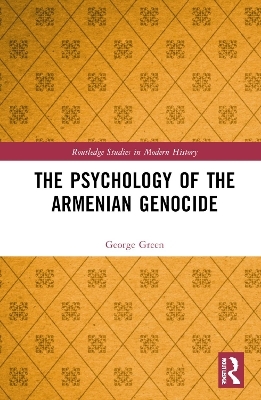
The Psychology of the Armenian Genocide
Routledge (Verlag)
978-1-032-83143-5 (ISBN)
- Noch nicht erschienen (ca. Februar 2025)
- Versandkostenfrei innerhalb Deutschlands
- Auch auf Rechnung
- Verfügbarkeit in der Filiale vor Ort prüfen
- Artikel merken
The Psychology of the Armenian Genocide will appeal to scholars and students alike interested in better understanding how a nation of people can be manipulated to support the annihilation of subordinate groups. It will also appeal to a much wider range of people would be interested in better understanding the manipulation of beliefs and morality to create intergroup divisions and intolerance for cooperation.
George Green is an Independent Researcher, whose primary research interests lie in the use of psychological mechanisms in the propaganda of both contemporary political leaders as well as those throughout history.
Introduction
Part I
Historical, cultural, and psychological foundations of intergroup divisions and prejudice, and the growth in followers of a radical and violent party.
Chapter 1. Historical, cultural and political background before the Armenian genocide.
Chapter 2. Psychological foundations for the growth and radicalization of the CPU/CUP.
Part II
Interrelationship of ideology, personality traits, psychological mechanisms and autocratic governance driving extremist beliefs and socially manipulative and violent actions.
Chapter 3. Authoritarian ideologies
Chapter 4. Dark personalities
Chapter 5. Autocratic facilitation of extremist beliefs and violence
Part III
Unravelling the callous social-cognitive manipulation that drives the propaganda, the decision making process, and the orchestration and perpetration of genocide.
Chapter 6. Propaganda
Chapter 7. Young Turk meetings and directives associated with the Armenian genocide.
Chapter 8. Perpetration of the Armenian genocide.
Chapter 9. Interdependency of ideology, personality traits, and psychological mechanisms. Dimensions in concert with other risk factors in the prelude to and orchestration of the Armenian genocide
| Erscheint lt. Verlag | 25.2.2025 |
|---|---|
| Reihe/Serie | Routledge Studies in Modern History |
| Verlagsort | London |
| Sprache | englisch |
| Maße | 156 x 234 mm |
| Themenwelt | Geisteswissenschaften ► Geschichte ► Allgemeine Geschichte |
| Geisteswissenschaften ► Psychologie | |
| Sozialwissenschaften ► Politik / Verwaltung ► Politische Systeme | |
| Sozialwissenschaften ► Politik / Verwaltung ► Politische Theorie | |
| ISBN-10 | 1-032-83143-X / 103283143X |
| ISBN-13 | 978-1-032-83143-5 / 9781032831435 |
| Zustand | Neuware |
| Haben Sie eine Frage zum Produkt? |
aus dem Bereich


